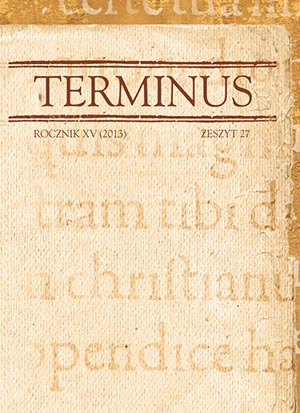Trudne dziedzictwo Troeltscha. Uwagi krytyczne o dwóch modelach studiów nad reformacją protestancką. Część druga: Historie (konfesjonalizacja
Difficult Legacy. Critical Remarks on the Two Models of Protestant Reformation Studies. Part 2: Histories (Confessionalisation – Reformation
Author(s): Jakub KorylSubject(s): Literary Texts
Published by: Wydawnictwo Uniwersytetu Jagiellońskiego
Keywords: Reformation; Begriffsgeschichte; irenicism; toleration; ecumenism
Summary/Abstract: Having the theoretical deliberation in the previous part as a point of departure, this paper discusses the other side of the dichotomy caused by Troeltsch’s thesis on methodological framework designed for theological inquiry. Unlike the first part of the article, which was focused on doctrinal questions, this one is devoted to the historical facet of Reformation studies. The predominant trend in recent Reformation historiography should be attributed to a model created by German historians, namely Confessionalisation. Rather than specific procedures typical for that model, the study describes historiosophical content, especially these parts of it that concentrate on the developmental socio-political tendencies of the early modern period. Consequently representatives of the Confessionalisation model, together with French historians gathered around the Annales school and later joined also by J. Bossy with his pragmatic concept of Christianity Translated, raised the question of whether the conventional notion of Reformation should retain its functional significance in the modern scholarship. Whether or not Reformation, Vorsattelzeit der Moderne, longue durée, Christianity Translated or anything else is in question, recent historiography under the influence of the social sciences, unlike the old-fashioned history of events, is focused on effects. Instead of giving an answer to the question of what, when or where happened in relation to the Reformation phenomenon, historians establish the purpose for which it took place and what its later implications and different ramifications were. Therefore, aspects of the early modern period ignored thus far, like the rise of the myth of Reformation reinforced by communication process, as well as a visual and propaganda revolution, and finally the impact of religious change upon the humanist movement (so called confessionalisation of humanism) have been brought into light. On the other hand, historians like H. Schilling deliberately justified the dichotomy of doctrinal or historical examination of the discussed period. Such a separation was thoroughly repealed only in twentieth-century theological hermeneutics, Lutheran in particular. R. Bultmann’s disciples, first of all the originators of the New Hermeneutic, not only aimed at a complementary description of the universal aspect of sacred matter entangled with particular human experiences, but also contributed tremendously to the explanation of Luther’s hermeneutic, henceforth no longer limited to exegetical procedures. The concluding part of the article is aimed at sketching a new attitude towards the lore obtained both by doctrinal and historical studies on Reformation
Journal: TERMINUS
- Issue Year: 15/2013
- Issue No: 2 (27)
- Page Range: 229-271
- Page Count: 43
- Language: Polish

